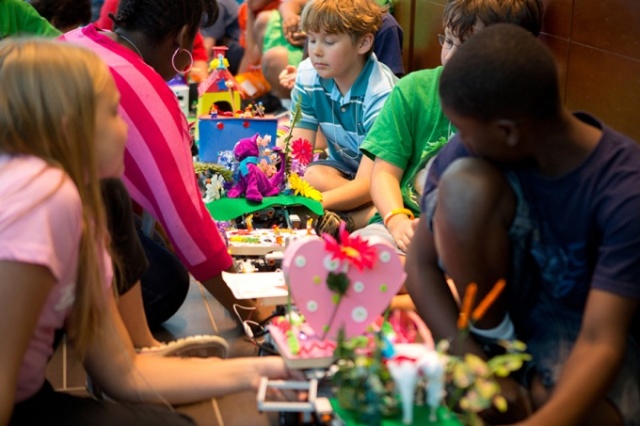Jul 17 2015
When the robots parade this Friday at the conclusion of the 2015 ARTY (Art, Robotics and Technology for Youth) Summer Workshop, you’re likely to see a kinder, gentler approach to the usual hulking, fire-breathing bots.
 Participants in a previous ARTY workshop wait with their robots for the parade to begin. Photo: Douglas Levere
Participants in a previous ARTY workshop wait with their robots for the parade to begin. Photo: Douglas Levere
And that’s the point of this innovative, week-long robotics workshop for middle school students ages 9-12 presented by UB’s Techne Institute, Canisius College and AT&T.
Administered by Sarah Bay-Cheng, director of the Techne Institute, and led by Debbie Burhans, associate professor of computer science at Canisius, the ARTY workshop is a contemporary alternative to the traditional practice of teaching robotics through programming camps built around competition, robot battles and simulated warfare.
The ARTY workshop is free and designed to be accessible to the broadest possible audience, though predominantly attracting groups currently underrepresented in the academic disciplines of science, technology, engineering and mathematics (STEM).
“We wanted to create a collaborative and creative engagement for the students that moves in the direction of creativity, problem-solving, aesthetics and beauty,” says Bay-Cheng. "We’re working to expand the way kids think about themselves and technology, to view themselves not just as consumers but as creators. This is important to attract not only girls and young women to STEM fields, but also to allow all students — boys and girls of diverse backgrounds — to think of themselves as creative and competent in contemporary digital culture.”
Students work with UB and Canisius artists and engineers to integrate their lessons in computer science, sensors, circuits, electronic music and design into the final program.
In addition to the workshop’s inventive art and technology curriculum, the entire ARTY experience is couched in a unique architecture of multi-tiered mentoring, an expansion to the program made possible by a contribution from AT&T.
High school students who have been specifically trained for the weeklong workshop mentor ARTY participants. Those high school students, in turn, are mentored by college and graduate students who are led by faculty.
“Diversifying STEM disciplines is not just a matter of attracting a more diverse population,” says Bay-Cheng. “It’s also important to establish networks and mentorships in those fields. It’s about being able to imagine yourself in different environments and seeing successful people who look like you from middle school though high school and college, to professionals in higher education and beyond.”
ARTY participants will showcase the robots they have designed and built at the capstone parade, a performance at the intersection of art and technology that incorporates elements of robotics, computer science and media art and design. The parade will take place at 10:30 a.m. July 17 in the Canisius College Science Hall, 2001 Main St., Buffalo. State Sen. Timothy M. Kennedy will address the students as part of the workshop’s finale and present each of the participants with congratulatory certificates.